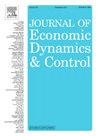Least squares learning? Evidence from the laboratory
IF 1.9
3区 经济学
Q2 ECONOMICS
引用次数: 0
Abstract
We report on an experiment testing the empirical relevance of least squares (LS) learning, a common way of modelling how individuals learn a rational expectations equilibrium (REE). Subjects are endowed with the correct perceived law of motion (PLM) for a price level variable they are seeking to forecast, but do not know the true parameterization of that PLM. Instead, they must choose and can adjust the parameters of this PLM over 50 periods. Consistent with the E-stability of the REE in the model studied, 97.8% of subjects achieve weak convergence to the REE in terms of their price level predictions. However, the number of participants that can be characterized as least squares learners via the adjustments they make to the parameterization of the PLM over time depends on properties of the data generating process of the dependent and independent variables. Participants learn the REE faster, and behave more like least squares learners when there is greater variance in the independent variable of the model. We consider several alternatives to least squares learning and find evidence that many subjects employ a simple satisficing approach.
最小二乘学习?来自实验室的证据
我们报告了一项测试最小二乘(LS)学习的经验相关性的实验,这是一种模拟个体如何学习理性预期均衡(REE)的常用方法。受试者被赋予了他们正在寻求预测的价格水平变量的正确感知运动规律(PLM),但不知道该PLM的真正参数化。相反,他们必须选择并能够在50个周期内调整该PLM的参数。与研究模型中稀土元素的e -稳定性一致,97.8%的被试对稀土元素的价格水平预测具有弱收敛性。然而,随着时间的推移,通过对PLM参数化的调整,可以被表征为最小二乘学习者的参与者数量取决于因变量和自变量的数据生成过程的属性。当模型的自变量有较大的方差时,参与者学习REE的速度更快,并且表现得更像最小二乘学习者。我们考虑了几种替代最小二乘学习的方法,并发现有证据表明许多科目采用了一种简单的令人满意的方法。
本文章由计算机程序翻译,如有差异,请以英文原文为准。
求助全文
约1分钟内获得全文
求助全文
来源期刊

Journal of Economic Dynamics & Control
ECONOMICS-
CiteScore
3.10
自引率
10.50%
发文量
199
期刊介绍:
The journal provides an outlet for publication of research concerning all theoretical and empirical aspects of economic dynamics and control as well as the development and use of computational methods in economics and finance. Contributions regarding computational methods may include, but are not restricted to, artificial intelligence, databases, decision support systems, genetic algorithms, modelling languages, neural networks, numerical algorithms for optimization, control and equilibria, parallel computing and qualitative reasoning.
 求助内容:
求助内容: 应助结果提醒方式:
应助结果提醒方式:


